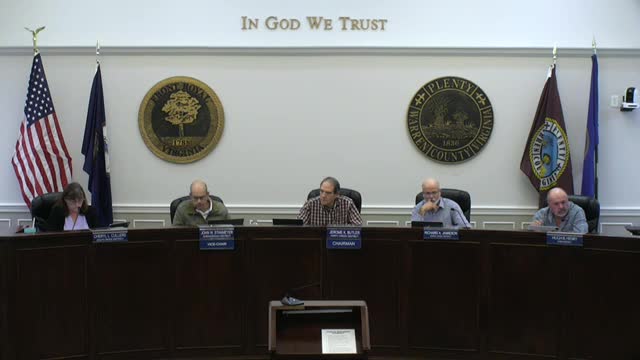Warren County supervisors table proposed ban on industrial well use after geology briefing, ask for written legal analysis
Get AI-powered insights, summaries, and transcripts
Subscribe
Summary
The board declined to authorize a public hearing on an ordinance that would prohibit industrial-scale withdrawal from private wells, citing the need for publicly available legal analysis and additional technical input after a geophysicist summary of county groundwater conditions.
Warren County Board of Supervisors members on Oct. 21 declined to authorize a public hearing on an ordinance that would prohibit industrial businesses from using groundwater wells, instead voting to table the item after a technical presentation and renewed requests for written legal guidance.
Martha Sadlick, a local geophysicist, summarized a U.S. Geological Survey (USGS) 2010 analysis and county well data, telling the board Warren County sits on a “tight” aquifer system where groundwater is supplied mainly by fractures, bedding planes and occasional caves rather than broad, porous reservoirs. She said well yields in the county are highly variable — many wells produce less than 5 gallons per minute while a few produce much more — and groundwater recharge depends on rainfall type, soil layers and surface development.
Sadlick recommended updating local groundwater data, using USGS expertise for a focused study, and considering storage options (tanks, quarry or reservoir storage) as part of long-term planning. Her presentation stressed that recharge is episodic and spatially uneven and that development and impervious surfaces reduce recharge.
Supervisor Doctor Jamieson, who introduced the ordinance earlier, said he supports protecting groundwater but repeatedly requested that the county attorney produce a written legal analysis publicly available to the board and residents before the county advertises a public hearing. Jamieson said he had asked for the legal memo since late September and would not move forward without it; he also cited Freedom of Information Act (FOIA) advisory opinions that argue for open written legal reasoning on proposed ordinances.
Other supervisors and several audience members raised procedural questions about drafting and staff involvement. Supervisor Stanmeyer, Supervisor Henry and others said they wanted more technical details from Fire and Rescue, county staff and the town where relevant, and clearer definitions in the draft ordinance (for example, how to distinguish “industrial” vs. other nonresidential uses and when a hydrogeologic study should be required).
After discussion the board voted to table the item. The board did not authorize advertisement of a public hearing on the ordinance at the meeting.
Why this matters: Warren County relies heavily on private wells and has areas with limited natural recharge. A locally adopted limit or permitting regime for industrial wells would affect large commercial and industrial projects, potentially shifting development patterns, but any restriction raises legal and procedural issues that the board said require explicit written counsel and more technical analysis before the public is asked to weigh in.
What’s next: The board voted to table the ordinance; members asked staff to pursue a publicly available written legal analysis and additional technical input (for example, from Fire and Rescue, the health department, and the USGS) before returning the item for advertising.
